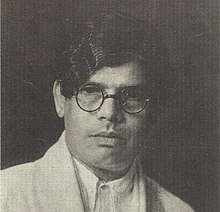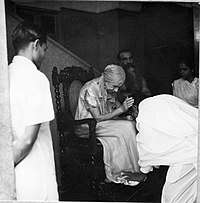Kapali Sastry
T.V. Kapali Sastry (* 3 September 1886 in Mylapore; † 17 August 1953 in Pondicherry) was an eminent Sanskrit scholar, author, translator and disciple of Sri Aurobindo.[1][2]

Biography
Sastry was born in 1886 in a traditional Vedic family at Mylapore, Tamil Nadu. He received his early education at home in Sanskrit under the guidance of his father, who was a Sanskrit scholar at the Oriental Manuscripts Library in Madras. After completing his education, he became a Sanskrit teacher at a High School in Madras.
At the age of twenty he came under the influence of Ganapati Muni, a prominent disciple of Ramana Maharshi and great scholar and poet, who passed on his vast knowledge and learning to Sastry. The latter got deeply immersed in Vedic and Tantric studies and published books and articles in English, Tamil, Telugu and Sanskrit.
After having been a disciple of Ramana Maharshi for some time, he went to Pondicherry in 1929 and became a disciple of Sri Aurobindo and the Mother (Mirra Alfassa). He studied deeply Sri Aurobindo's philosophy and writings, especially his interpretation of the Rig Veda which he explored comprehensively in several books.[3][4]]

Sastry died on 17 August 1953 in Pondicherry.
Further reading
Works of Kapali Sastry (Selection)
English
- Lights on the Veda
- Sidelights on the Tantra
- Sri Aurobindo: Lights on the Teachings
- The Maharshi
- Gospel of the Gita
- Rig Bhashya Bhumika
Sanskrit
- Rig Veda Bhashya (Siddhanjana)
- Matr-tattva-Prakasha
- Savitri
- Ahnikastava
Tamil
- Agni Suktangal
- Sri Aravindar
- Vennira Sudaroli
Telugu
- Matra Vakkulu
Secondary Literature
- P. Raja (1993), M. P. Pandit. A Peep into his Past. Pondicherry, Dipti Publications, pp. 21–26
- S. Ranade (1997), Madhav Panditji. Pondicherry, Dipti Publications, pp. 10–11